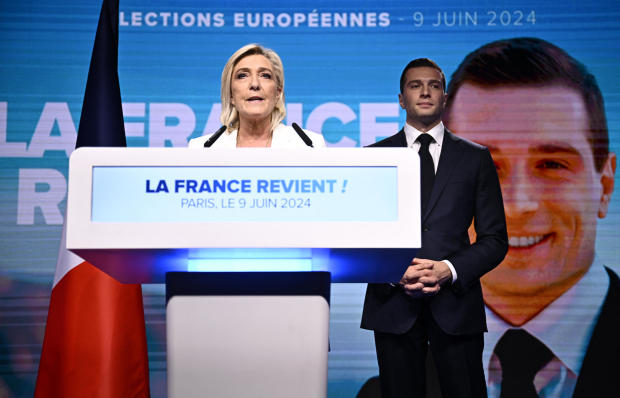2024 French election begins, with far-right parties expected to make major gains in parliament
Paris — Voters in France are at the polls Sunday for the first of two rounds of an election to select 577 members of the National Assembly, the lower house of parliament. The snap elections were called by President Emmanuel Macron on June 9 after his ruling Renaissance party performed poorly in elections for the European Parliament, which governs the 27-nation European Union.
The hastily called vote left France's political parties with just 20 days to form alliances, scramble for support and convince people to vote for their candidates.
Why are there 2 rounds in the French election?
France's two-round majority system was adopted in a 1962 referendum and introduced for the first time for presidential elections in 1965.
The highest-scoring candidates in the first round go forward to the second round. Voters can choose only one candidate. The argument was that the second round gives voters another chance to vote for their preferred party, even if their preferred candidate is eliminated in the first round.
It was considered a fairer system, and proponents claimed the two-round voting would bring more political stability, but recent years have suggested otherwise and there have been calls to scrap the system and replace it with a single-round vote, in line with most of Europe.
Observers frequently suggest that the French vote in the first round with their heart and in the second with their head. That trend was evident in recent presidential runoffs that included far-right candidates. For example, left-leaning voters widely gritted their teeth and voted for conservative Jacques Chirac over then-far-right leader Jean-Marie Le Pen in the 2002 presidential runoff.
Only a handful of countries use a two-round system — many of them former French colonies that inherited it from France.
When will the election results be announced?
Full results will likely be available on July 8, the day after the second round.
The first exit poll results, however, are expected to be available as soon as voting closes on July 7, by around 2 p.m. Eastern. These results are usually very accurate in France, but the fractured nature of the political landscape this time around may make it hard to make an accurate prediction quickly based on the first-round results.
It's reasonable to expect at least an indication of the major trends on the night of July 7.
Who is predicted to win in France's parliamentary elections?
Opinion polls ahead of the first round showed the far-right grouping of parties led by Marine Le Pen's National Rally (RN) firmly in the lead, predicted to win 36% of the vote. Polls indicate the far-right group has a good chance of taking the second, decisive round of the voting on July 7, too.

The polls show a grouping of left, far-left and various green parties is likely to come in second in Sunday's first election round, capturing around 29% of the vote.
Trailing behind is the centrist group led by Macron's Renaissance party, which polls suggest will garner only about 19.5% of the vote.
France has been gradually moving to the right in recent years, but this is the first time the far-right parties have a real shot at leading a new government.
The traditional, more centrist parties that have led France for decades have been losing ground over the last 20 years as voters move to the extremes.

The Socialist Party — more center-left than socialist these days — performed well in the European elections, however, and is determined to have a say in how the combined left group progresses to the second round. Whether they can capture enough of the vote to mitigate the rise of the far-right remains a big question.
What are the possible consequences for President Macron?
However it goes down on July 7, it seems likely that France is heading into a period of "cohabitation" — when a president from one party or side of the political aisle must rule alongside a government from another party or political persuasion.
This can lead to difficulties in getting laws passed and budgets agreed.
There have been a few cohabitations in contemporary France, most notably the first one from 1986 to 1988, when Chirac was prime minister under Socialist president Francois Mitterrand. Personal relations play a strong part in making a cohabitation work. Mitterrand despised Chirac and rarely missed an opportunity to speak down to or about his prime minister.
Relations were much easier later on when Chirac, as president, found himself in a cohabitation with socialist Prime Minister Lionel Jospin, whom he knew well. Macron and RN frontrunner Jordan Bardella have no such relationship to build on, and if the far-right parties win enough seats to demand the premiership in a new coalition government, it will likely be a bumpy ride.
Speaking after his surprise announcement that he was dissolving the National Assembly and calling snap elections, Macron reassured the French people that he was going nowhere before the end of his mandate: "You can trust in me to act as your president until May 2027, to be the protector of our republic, our values, at every second, respectful of the pluralism of your choices, at your service and that of the nation."
Why is France's election so important for Europe, and beyond?
As a leading player in the EU, all eyes are on France as its neighbors worry about what the election results will mean for the bloc, which shifted right overall in the recent EU-wide elections.
For the past few decades, France and Germany have led European policymaking in an effective partnership. As Germany has been more embroiled in domestic matters in recent years, France has taken on more of those international affairs functions alone. Macron sees his country's role in international politics as fundamental, and he's been keen to speak as the leading EU voice on Ukraine, for instance.
Douglas Webber, Professor Emeritus of Political Science at the INSEAD business school in Paris, believes Europe has cause for concern over the French election, saying a cohabitation would mean "uncertain prospects or probably very negative consequences for France's role and for its engagement in the EU."
Speaking to journalists from the Anglo-American Press Association in Paris, Webber said that uncertainty could linger until the next presidential elections in 2027, when far-right leader Le Pen has set her sights firmly on winning the presidency.
Webber noted that Le Pen had already indicated her "aim to transform the EU and, in effect, to roll back its powers, as well as, amongst other things, to withdraw France from NATO."
That, he warned, would be "a fairly good outcome for Vladimir Putin, and not a very encouraging one for the future and fate of Ukraine."
- In:
- Ukraine
- Election
- Emmanuel Macron
- France
- European Union
- NATO
Elaine Cobbe is a CBS News correspondent based in Paris. A veteran journalist with more than 20 years of experience covering international events, Cobbe reports for CBS News' television, radio and digital platforms.
Disclaimer: The copyright of this article belongs to the original author. Reposting this article is solely for the purpose of information dissemination and does not constitute any investment advice. If there is any infringement, please contact us immediately. We will make corrections or deletions as necessary. Thank you.
Title:2024 French election begins, with far-right parties expected to make major gains in parliament
Url:https://www.investsfocus.com









